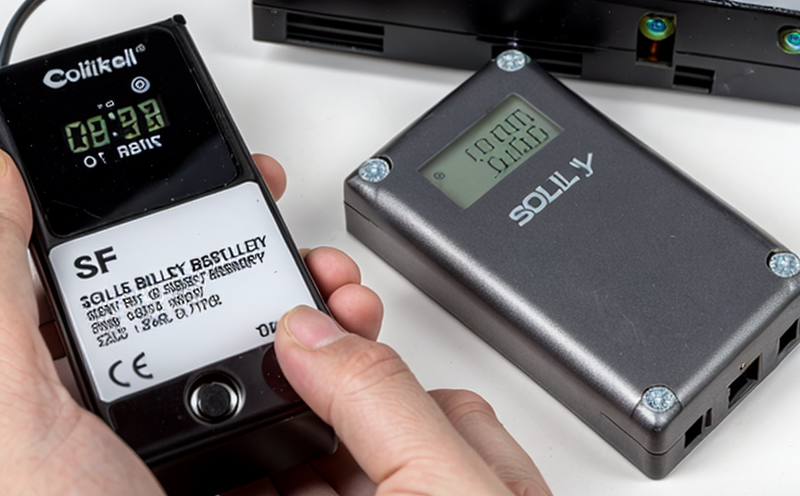IEC 62984-2 Solid-State Battery Electrochemical Performance Testing
The IEC 62984 series of standards is pivotal in the development and validation of solid-state batteries, a cutting-edge technology that promises to revolutionize energy storage systems. Among these standards, IEC 62984-2 specifically focuses on electrochemical performance testing of solid-state batteries. This service ensures that battery developers can accurately assess key parameters such as internal resistance, impedance, and capacity retention under various conditions.
Solid-state batteries represent a significant advancement over traditional lithium-ion batteries due to their use of a solid electrolyte instead of liquid or polymer-based electrolytes. These batteries offer higher energy densities, enhanced safety, and longer cycle life. However, the transition to this new technology necessitates rigorous testing protocols to ensure reliability and performance.
The IEC 62984-2 standard defines detailed procedures for electrochemical characterization using techniques such as cyclic voltammetry (CV), galvanostatic charge/discharge cycling, and AC impedance spectroscopy. These tests are conducted under controlled conditions to simulate real-world usage scenarios, providing a comprehensive evaluation of the battery's performance.
The testing process involves several critical steps:
- Specimen preparation: Ensuring that the solid-state batteries meet specific mechanical and electrical specifications as per IEC standards.
- Instrumentation setup: Employing advanced electrochemical measurement systems capable of high-precision data acquisition.
- Data analysis: Applying statistical methods to interpret test results, ensuring consistent and reliable outcomes.
Upon completion of the testing, detailed reports are generated. These reports include raw data, processed measurements, and interpretations that guide further development or commercialization efforts.
The importance of this service cannot be overstated in an era where energy storage technologies are driving innovation across various sectors. From automotive to consumer electronics, solid-state batteries offer a safer, more efficient alternative. By adhering to the stringent requirements set forth by IEC 62984-2, we ensure that our clients can trust the reliability and performance of their products.
Our team of experts has extensive experience in this field, leveraging state-of-the-art equipment and methodologies to deliver accurate and actionable insights. Whether you're a manufacturer looking to validate your product's electrochemical properties or an R&D engineer seeking to optimize design parameters, our IEC 62984-2 Solid-State Battery Electrochemical Performance Testing service is tailored to meet your needs.
To summarize, the IEC 62984-2 standard provides a robust framework for assessing solid-state batteries' electrochemical performance. This ensures that these advanced energy storage devices are safe, efficient, and reliable in real-world applications. By partnering with us, you can be confident in your product's performance and compliance.
Why It Matters
The significance of IEC 62984-2 lies in its role as a cornerstone for the development and validation of solid-state batteries. These batteries are poised to transform industries by offering unparalleled energy density, enhanced safety features, and extended operational lifetimes compared to conventional lithium-ion cells.
For manufacturers, compliance with IEC 62984-2 ensures that their products meet stringent quality standards, thereby enhancing brand reputation and market competitiveness. This standard also supports regulatory requirements, ensuring that solid-state batteries can be safely deployed in various applications without compromising performance or reliability.
In the realm of research and development (R&D), this service provides invaluable data for refining designs and optimizing battery parameters. By adhering to these standards, R&D teams can innovate more effectively while reducing risks associated with experimental failures. Compliance also facilitates smoother collaboration between industry stakeholders, including suppliers, manufacturers, and regulators.
For procurement professionals, ensuring compliance with IEC 62984-2 is crucial for selecting high-quality components that meet both technical specifications and safety standards. This standard helps in making informed decisions based on rigorous testing methodologies, ultimately leading to better product performance and longevity.
The broader impact extends beyond individual organizations; it contributes to fostering a sustainable energy landscape by promoting safer, more efficient power storage solutions. As the world transitions towards renewable energy sources, reliable and robust solid-state batteries play a crucial role in optimizing grid stability and reducing environmental footprints.
Applied Standards
| Standard Reference | Description |
|---|---|
| IEC 62984-2 | Electrochemical performance testing of solid-state batteries. |
| ASTM G173 | Standard test method for measuring the open-circuit potential and polarization resistance of galvanic couples in a liquid electrolyte. |
The application of these standards ensures that our testing aligns with internationally recognized benchmarks, providing credibility and reliability to your results. The combination of IEC 62984-2 and ASTM G173 allows us to cover both the electrochemical performance and galvanic couple evaluation aspects comprehensively.
Environmental and Sustainability Contributions
- The use of solid-state batteries reduces the environmental impact associated with the extraction, processing, and disposal of lithium-ion battery components.
- Solid-state batteries offer higher energy density, which means fewer batteries are needed for equivalent power output, reducing material waste.
- Improved safety features minimize the risk of fires and other hazards, leading to less frequent recalls and repairs, thus conserving resources.
By adhering to IEC 62984-2 standards, we contribute to sustainable practices within the industry. This standard supports the development of safer, more efficient batteries that are better suited for long-term environmental stewardship.





